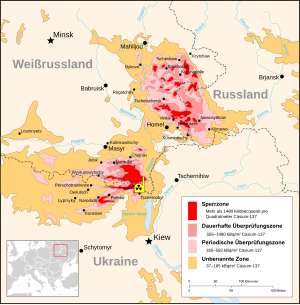
Radiation hotspots of Cesium-137 in 1996 resulting from the Chernobyl nuclear power plant accident. -Wikipedia
Experts believe the radioactive core in reactor No. 2 at the crippled Fukushima nuclear power plant has melted through the bottom of its containment vessel and on to the concrete floor of the drywell below. This new development has raised fears of a major release of radiation at the site, and some nuclear industry experts are saying that while they don’t believe there is a danger of a Chernobyl-style catastrophe, it’s not going to be good news for the environment.
The major concern when molten fuel breaches a containment vessel is that it will react with the concrete floor of the drywell, releasing radioactive gases into the surrounding area. At Fukushima, the drywell has been flooded with seawater, which was a last ditch effort to cool any molten fuel that escapes from the reactor and reduce the amount of radioactive gas released.
The drywell is surrounded by a secondary steel-and-concrete structure designed to keep radioactive material from escaping into the environment. But an earlier hydrogen explosion at the reactor may have damaged this, and the detection of water outside the containment area that is highly radioactive and can only have come from the reactor core, is a good indication that the containment area has been breached.
In the meantime, countries around the world are reassessing their nuclear power programs. Britain has signaled that they could take a step back from nuclear power in the wake of the disaster. Germany ordered a temporary halt to the country’s seven oldest reactors, and China is considering scaling back their program.
France, which gets about 80 percent of its energy from atomic power and has been the poster child for nuclear power during the recent nuclear renaissance, wants threats from airplane crashes and terrorists excluded from safety checks planned on European reactors following the Fukushima nuclear accident. An interesting stance to take considering as recently as October of 2010, the French defense minister, Herve Morin told the French people that a terrorist threat exists, and could hit them at any moment.
At a minimum, governments should insist on two conditions for the future of the next generation of nuclear power plants: they have to be safe and they can not let the taxpayer be ripped off. This is a opportunity for investment into renewable energy sources such as solar, wind and energy storage that don’t have the potential to be really, really bad news for the environment and the people who live in that environment.
Read Full Post »




